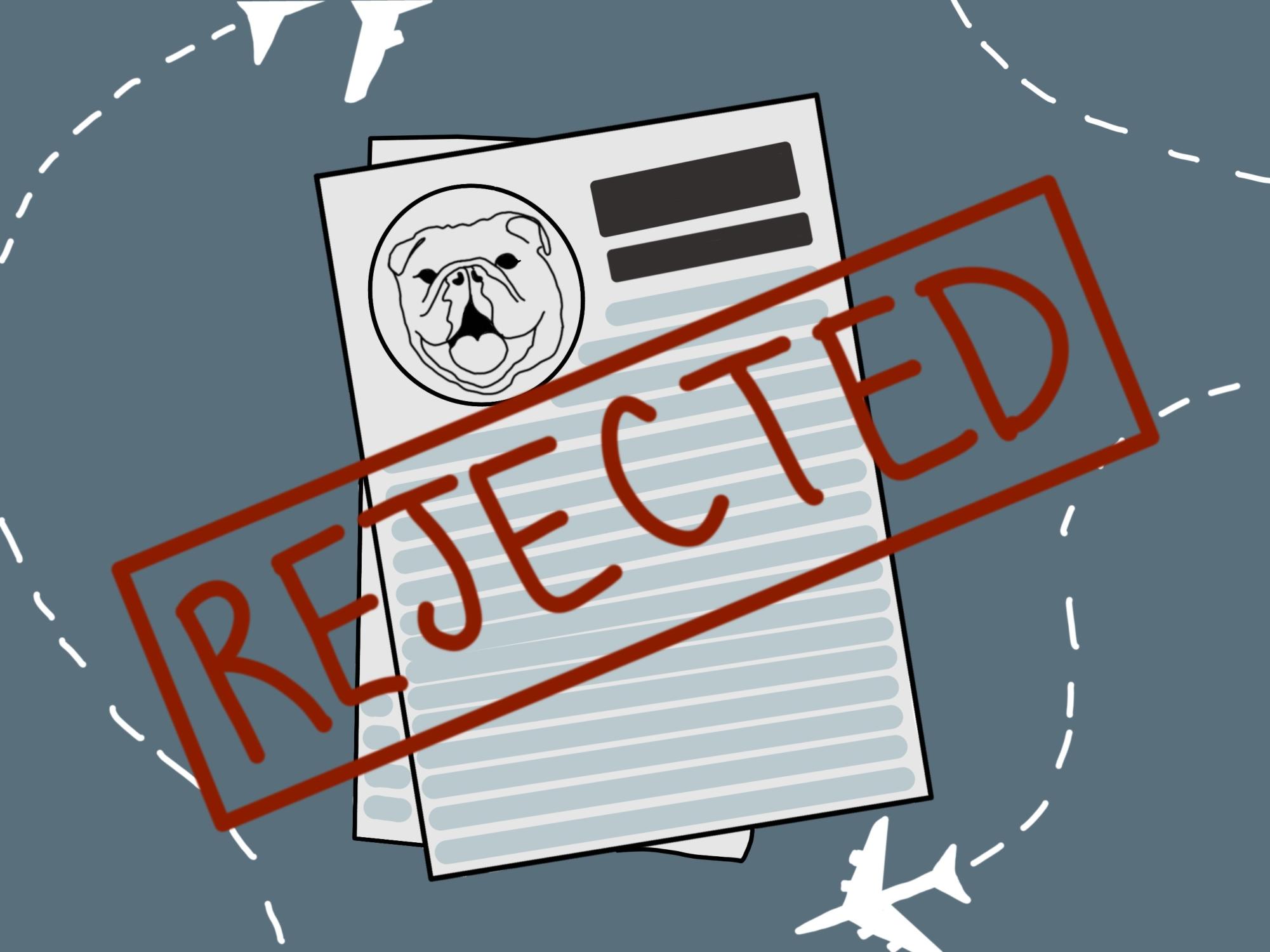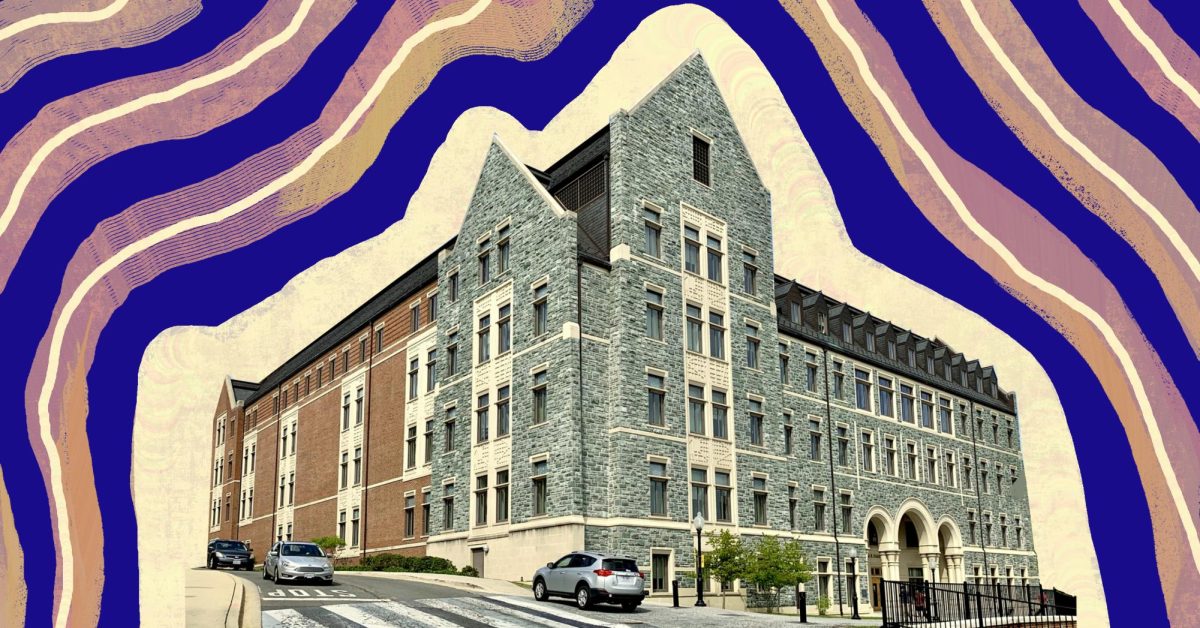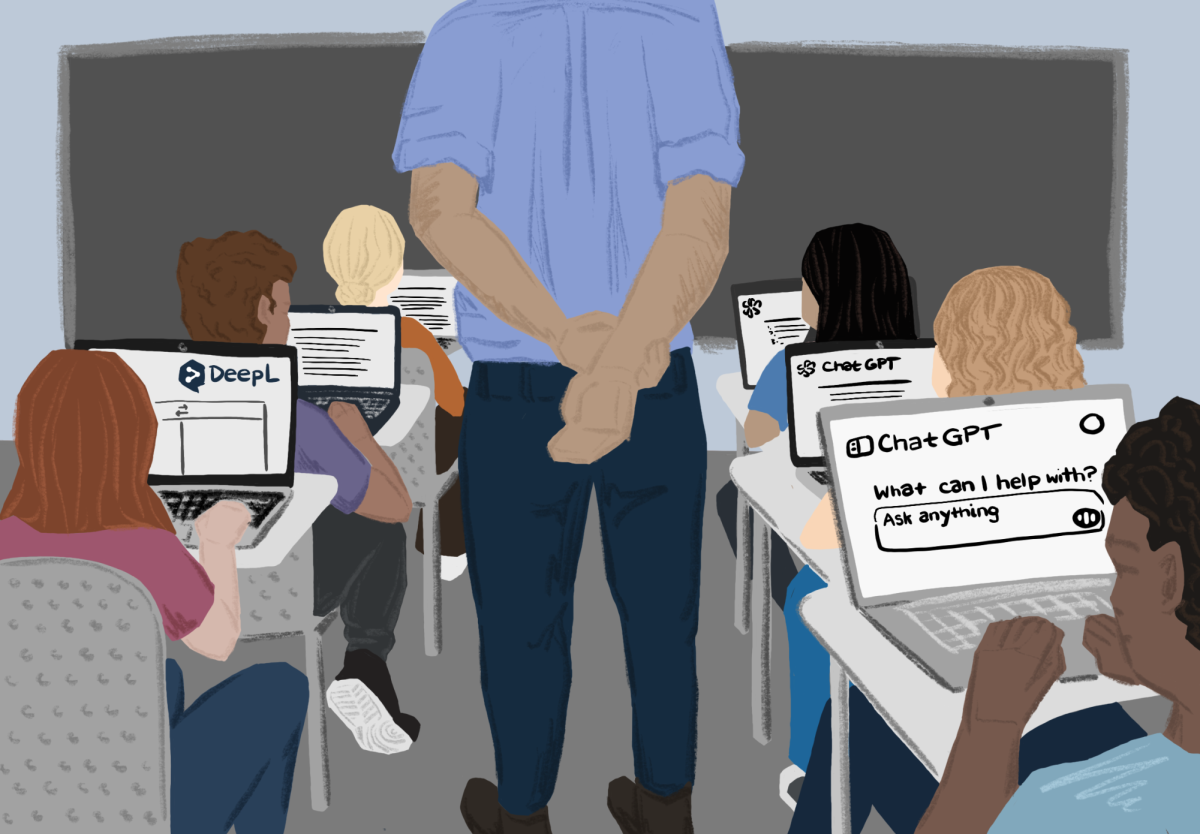Serhii Li (SFS ’28) always dreamed of attending college in the United States.
Coming from a small town in the southern Kherson region of Ukraine, Li was ecstatic when he received visa approval in 2022 to attend the Future Leaders Exchange (FLEX), a U.S. Department of State program granting Eastern European and Eurasian high school students a fully funded academic year of study in the United States. Since receiving his admission letter to Georgetown University, Li has continued studying international economics.
As of late, though, Li has become concerned about his upcoming visa reapplication process, given the new vetting policies enacted by the Trump administration.
Since January, Trump has issued several executive orders on immigration, prompting enhanced vetting for visa applicants, which includes monitoring an applicant’s online presence. The State Department has also mandated that visa applicants set their social media profiles to public. Previously, F-1 visa applicants had more flexibility and were able to apply for visas at U.S. embassies or consulates outside their home country.
Li said the unpredictable vetting process has created a precarious situation for international students who have been trying to keep track of the ongoing changes.
“The visa issuing system is not really developed yet,” Li told The Hoya. “We are all very scared when everything changes all of a sudden.”
“In my mind, there’s a lot of anxiety — there’s a lot of uncertainty for the international students, and I am in the same spot,” Li added.
When Julia Wang (SFS ’27) returned to the United States from China this past summer, she faced extensive questioning at customs, which she said she had never encountered before.
“This time they asked me multiple questions,” Wang said. “Like, why do you go to China? Why were you in China? Why were you in China for the summer?”
“I remember being very nervous in my mind because I’ve heard from a lot of people that it’s not looking great for international students, and there are a lot of cases of visas being revoked,” Wang added.
Leandro Guevara Neyra (CAS ’28), an international student from Peru, said the current visa application process has been more stressful compared to his visa application in the summer of 2024.
“I think that especially now, they’re asking you for all your social media before you apply; so not only your Instagram, but absolutely every social footprint you’ve ever had,” Guevara Neyra told The Hoya. “You have to submit that to the embassy before applying for your visa, so they can do a background check on you, which is something I didn’t have to do.”
Guevara Neyra added that the process makes people feel more vulnerable than necessary.
“I think it’s a process that is very dehumanizing,” Guevara Neyra said. “I think that, especially in embassies in Latin America, there is a trend that people are just genuinely mean. I was with my dad, and I was very stressed. For most international students, just being in the line and then being in the process means being very stressed.”
A university spokesperson said international students play an integral role in the Georgetown community, highlighting Interim President Robert M. Groves’ Feb. 24 message to the community on its mission and values.
“Georgetown’s mission, including that we are ‘founded on the principle that serious and sustained discourse among people of different faiths, cultures, and beliefs,’ continues to guide us,” the university spokesperson wrote to The Hoya.
Georgetown offers some resources for international students and scholars, including the Office of Global Services (OGS), which provides advising and support to international students, and Undocumented Student Services, which offers support to students without citizenship.
Despite the university’s support, international students at Georgetown have experienced difficulties in their visa application process, including long wait times and social media checks. Students have struggled to navigate the visa process, prompting concerns that their visa renewals will be delayed or rejected.
Before and After the Executive Orders
When Kateryna Kvasha (SFS ’28), an international student from Ukraine, was applying for a visa in 2022, she said she needed to complete an obligation form online in order to receive a visa interview.
“I feel like I didn’t stress that much about the online application,” Kvasha told The Hoya. “It was just a bit lengthy, but it wasn’t that difficult.”
Kvasha added that, when she received a visa interview, she was somewhat nervous.
“The interview part was the one that I was worried about, but it was in 2022, before the new administration; there were no concerns at that point,” Kvasha said. “I was only worried about what kind of questions they’re going to be asking me at the interview.”
When she started high school in the United States after moving from China in 2019, Wang said her visa application process was straightforward and easy to complete.
“It was really easy when I applied to high school, because the policy was way friendlier toward international students and Chinese students back then,” Wang told The Hoya.
This past summer, however, when Wang was working on her visa reapplication, she said the much slower processing time left her without a passport for a month.
“I did not get my passport back after a month, because they said that there is some required background check that is needed for me and my visa,” Wang said. “This is something that didn’t happen to me when I applied for my F1 visa when I was a high school student.”
Mark Vodianyi (GRD ’26), a master’s student from Ukraine who applied for a student visa in 2022, said the process was easy.
“They asked a few questions, like, ‘What am I going to study in the U.S.? What do you want to do?’” Vodianyi told The Hoya.
An international student from Ukraine, who requested anonymity for fear of government retaliation, also said their first visa application process in 2022 went smoothly.
“The first time it was pretty chill,” the student told The Hoya. “I was back in Belgium and I submitted my application, then I had an interview. They asked me a couple of questions — basic questions, like, ‘What do you want to study? Why?’ And then it got approved immediately, and I picked up my passport in a few days — it was really smooth.”
The international student’s visa renewal process in May 2025 took much longer than their initial application. Their visa had been renewed in a third-party country other than their home country and the United States, so the student waited until the semester was over to renew their visa in Germany.
The student said their second visa took weeks longer to receive than their first visa three years earlier.
“They told me, ‘Oh, your documents are fine; we don’t have any questions, but we want to check your social media,’” the student said. “And for this reason, they did not approve my visa immediately.”
The student said that, in order to receive their visa, officials at the United States consulate informed them that they needed to make their private social media account public.
“I had to wait for three weeks for them to check my social media accounts,” the student said. “I had to give them all of the links; my accounts had to be public.”
The student was not sure if their accounts were still being monitored, but said they kept their accounts public just in case.
“They were really concerned with media presence,” the student added. “I don’t know what exactly they were looking for, but it was scary at the time.”
Now, international students must go through the visa application process in their country of citizenship, a requirement that was not previously in place. In December 2022, the State Department waived in-person visa interviews at consulate offices for F-1 and J-1 visa recipients, expediting the visa application process and allowing students to apply from countries where they do not hold citizenship. However, the Trump administration announced in September 2025 that non-immigrant visa applicants must seek an interview at a U.S. embassy or consulate in their home country.
Know Your Rights
Some international students have called for the university to offer professional legal advice so that students do not get lost in the immigration system.
Vodianyi said that, on top of the administration’s crackdowns on immigration, the limited availability of resources regarding immigration law makes it only more difficult to know what to do.
“More has to be done in terms of creating a legal office for OGS — they wouldn’t consult on anything that has to do with immigration,” Vodianyi said. “I wish we had a legal office at Georgetown with a licensed lawyer who could provide consultations for the Georgetown community.”
OGS has ramped up its response to provide resources to international students. Since January 2025, OGS has sent more than 20 immigration updates, ranging from country-specific announcements regarding South Sudanese and Chinese passport holders to updates about the visa interview waiver process.
Additionally, OGS began sending monthly newsletters with resources to F-1 and J-1 visa recipients in April 2025. These newsletters include information on recent immigration changes, advising appointments and travel signatures. Throughout the school year, all newsletters included reminders to international students to carry forms of identification, including passport, ID, records of F-1 or J-1 visa and I-20 forms, on their person at all times.
To support students managing the immigration system’s complexities, some student organizations have begun facilitating “Know Your Rights” trainings. Georgetown’s chapter of the legal nonprofit American Civil Liberties Union (ACLU) held workshops to inform students, including international students, of rights conferred by the U.S. Constitution.
Advait Swaroop (CAS ’27), the Georgetown ACLU’s external activism director, said the organization has planned extensive “Know Your Rights” training sessions to help international students understand their access to resources.
“I also think it’s important to emphasize that international students are not alone in this fight,” Swaroop told The Hoya. “Many in our community strongly oppose recent attempts to restrict free expression and other key rights, particularly when aimed at international students. There is broad solidarity in ensuring their voices are heard and their rights respected.”
Restrictions on the visa process have raised concerns about free speech across the country.
In a Jan. 31 update, the OGS informed Georgetown community members of the State Department’s enhanced vetting processes for visa applicants, which included screening for antisemitic activity. They provided a White House-issued Fact Sheet, which referenced the administration’s move to cancel student visas of all Hamas sympathizers on college campuses.
Following this, on March 17, 2025, federal immigration officials detained Georgetown postdoctoral researcher Badar Khan Suri based on allegations that his posts on X qualified as antisemitic and justified his deportation. Khan Suri posted frequently on X in support of Palestine.
Khan Suri opposed Israeli actions on X and did not advocate for breaking the law.
Suri’s detention raised questions about free speech rights for visa-holders on Georgetown’s campus and across the country. In an email sent on March 25, 2025 regarding the detention of Badar Khan Suri, Interim President Robert M. Groves said that free speech is integral to Georgetown’s Jesuit values.
The State Department later announced new visa restrictions on May 28 targeting foreign nationals who censor U.S. citizens’ speech.
Guevara Neyra said the unclear visa process has caused him to worry about legal red lines regarding free speech.
“I think that the bigger problem is that this is very confusing,” Guevara Neyra said. “No one really knows what’s the limit. No one knows how much you can say. How much can you not say? When am I gonna get targeted? When is this gonna raise a flag? Can I say political stuff in class? What if someone records me? What if someone who just doesn’t like me posts this?”
Guevara Neyra said this uncertainty has raised questions about what free speech looks like for international students under the current political administration.
“Freedom of speech is not fully eliminated for international students, but it’s just very hard to protest,” Guevara Neyra said. “It’s very hard to put your thoughts on an Instagram story. It’s very hard to talk about the things you would like as the rest of the Georgetown community does, because of your specific position as an international student.”
An Uncertain Future
With frequent changes in visa policies, students are uncertain about the future of their visa applications and immigration statuses.
Vodianyi — who is currently studying in the United States on temporary protective status (TPS), a legal status the Biden administration created for foreign nationals who are unable to return safely to their home country under current conditions — said a lack of clarity in the process has left him unsure about his future standing in the country.
“The future of my TPS status is unknown,” Vodianyi said. “It is still pending on the decision, so nobody knows whether they’re going to continue it or cancel this program.”
Vodianyi added that the U.S. Department of Homeland Security’s (DHS) recent cancellation of TPS status for individuals from Venezuela and Haiti created an uncertain future for Ukrainian students who are in similar circumstances.
“Ukraine is kind of in the same class, so I’m not sure how this administration is going to move forward with this legal protection,” Vodianyi said.
A second international student, who requested anonymity for fear of government retaliation, agreed that the removal of certain legal protections, especially limitations on free speech, worried them.
They said they were fearful of having their social media accounts surveilled by the State Department, given the unpredictable political climate. They worried their online speech and digital footprint, including their activism in groups supporting Palestinian liberation, would be tied to political movements, putting their visa at stake.
“I had a little bit of a scare earlier this year when they said they were going to look through social media accounts and see if there were any signs of pro-Palestinian support, things like that,” the student said. “I actually did go through my entire following list just to see if there was anyone very openly encouraging the Palestinian cause.”
“I unfollowed a few people because of that, not because I disagree with their views, but just for my general safety — you just never know,” the student added.
Guevara Neyra said he now worries that classroom conversations and day-to-day interactions taken out of context might derail his future.
“Saying something that is wrong could cost you your visa, which means almost everything you’ve worked for in high school, middle school, for almost all of your conscious life,” Guevara Neyra said. “For me, it would mean going back to Peru, which is a place I love, but is not where I wanted to be in college, nor where I want to end up at the end of my life. So it would feel like a huge step back.”
For international students who hope to stay in the United States after graduating, OGS offers career resources and post-graduate guidance. However, some students are not fully satisfied with the range of services OGS offers.
Reesa Bhowmik (SFS ’26), an international student from Singapore, said OGS was helpful when it came to routine questions, but recent holdups in the visa process have left many international students with more complex concerns in limbo.
“They’re pretty decent at most questions that you might have that are very straightforward,” Bhowmik said. “At the moment, it gets a little complicated. I’ve seen that they usually don’t have any answers or support.”
Anshuraj Pal (CAS ’27), an international student from India, said OGS not only struggled to communicate clearly with students but also did not offer specific guidance on travel.
“For my friends who go to UMich Ann Arbor, they got explicit notices to not travel back this summer,” Pal told The Hoya. “OGS here did not give us any explicit notice. They just told us, if you travel, do so at your own risk.”
“Even when I tried to consult with OGS regarding that, they basically said, ‘We are not in any position to give you any advice on that. You’ll have to talk to an immigration lawyer,’” Pal added. “OGS is hands-off in that sense.”
Bhomwik said the current landscape has made it very difficult for international students to focus on their studies, instead creating an unnecessarily hostile atmosphere.
“At the end of the day, all of those factors, all of those misconceptions about international students, only harm the community in the long run,” Bhomwik told The Hoya. “Most international students are not here to speak out against the government or create any kind of mass unrest at the end of the day. They’ve all sacrificed so much and moved across the world to come to college in America.”
“I’m here to get an education. I’m here to experience college life in America and everything that comes with that,” Bhomwik added.







